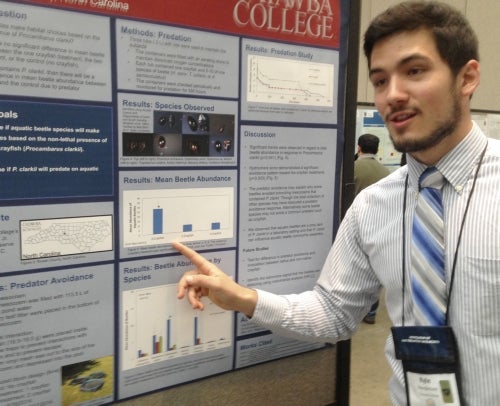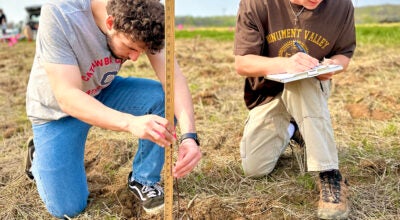Catawba biology students present research and participate in conferences
Published 12:00 am Thursday, April 30, 2015

- Kyle Hnderson presents his research. Submitted.
Over the past several weeks, Catawba College biology students have presented their research at state and regional conferences.
“Presenting research at undergraduate research conference exposes you to one of the ways that scientist share information. People see your research and ask questions you never thought of. You also gain experience in presenting in front of many new people,” said senior Kyle Henderson.
Paul Frye, a senior and pre-vet student, elaborated, “Presenting at conferences gives you a chance to network with others doing similar research and with professors at other institutions, possibly giving yourself an advantage when applying to grad schools or professional programs.”
On March 27 and 28, students and faculty attended the annual meeting of the North Carolina Academy of Science, held at the Wake Forest Biotech Place in Winston-Salem. The students, faculty mentors, and titles of their talks included:
- Christopher Bolick presented “Hybrid intermediacy in Ashe’s sumac (Rhus ashei) a hybrid of the federally endangered Michaux’s sumac (Rhusmichauxii) and common smooth sumac (Rhus glabra).” His faculty mentor was Jay F. Bolin.
- Elizabeth Brown, Hugh Smith, Joshua York and Bruce Harrison presented “Morphological and Molecular Identification of Mosquito Diversity in the Fred Stanback Jr. Ecological Preserve at Salisbury, North Carolina.” Their faculty mentor was Carmony Hartwig.
- Paul Frye presented “The Effects of Increased Levels of CO2 on Photosynthesis and Respiration of Favia fragum.” His faculty mentor was Constance Lowery.
- Kyle Henderson presented “Non-lethal predator avoidance by aquatic beetles to the red swamp crayfish (Procambarus clarkii).” Bolin was his faculty mentor.
- Finn Furstenwerth, Taylor Spillman and Duncan Cameron presented “Is the Southern Blue Thread (Burmannia capitata) partially mycoheterotrophic?” Bolin was their faculty mentor.
Frye received third in the John Bowley Derieux Research Award competition for his research and presentation on the effects of one aspect of climate change, ocean acidification, on metabolism of the golfball coral, Favia fragum.
Biology students and faculty attended the annual meeting of the Association of Southeastern Biologist in Chattanooga, Tennessee, April 1-4.
The Southeast Regional meeting of the Beta Beta Beta Biological Honors Society was held in conjunction with the conference.
The students, faculty mentors, and titles of their talks are:
- Joshua York, Elizabeth Brown, Hugh Smith and Bruce Harrison presented “Disease vector status of mosquito species from the Fred Stanback Jr. Ecological Preserve at Catawba College, Salisbury, North Carolina.” Carmony Hartwig was their faculty mentor.
- Elizabeth Brown, Hugh Smith, Joshua York and Bruce Harrison presented “Morphological and Molecular Identification of Mosquito Diversity in the Fred Stanback Jr. Ecological Preserve at Salisbury, North Carolina.” Carmony Hartwig was their faculty mentor.
- Christopher Bolick presented “An investigation of hybrid intermediacy in Ashe’s sumac (Rhus ashei) a hybrid of the federally endangered Michaux’s sumac (Rhusmichauxii) and common smooth sumac (Rhus glabra).” Bolin was his faculty mentor.
- Kyle Henderson presented “Non-lethal predator avoidance by aquatic beetles to the red swamp crayfish (Procambarus clarkii).” Bolin was his faculty mentor.
- Finn Furstenwerth, Taylor Spillman and Duncan Cameron presented “Is the Southern Blue Thread (Burmannia capitata) partially mycoheterotrophic?” Jay Bolin was their faculty mentor.
- Taylor Spillman, Finn Furstenwerth and Duncan Cameron presented “An Isotopic and Molecular Study of Mycoheterotrophy in the Southern Blue Thread (Burmannia capitata).” Bolin was their faculty mentor.
- Paul Frye presented “The Effects of Increased Levels of CO2on Photosynthesis and Respiration of Favia fragum.” Constance Lowery was his faculty mentor.
Again, Paul Frye received an award for his research and presentation — honorable mention in the Johnson C. Johnson Award for Excellence in Undergraduate Research.
Catawba College’s Tau Eta chapter of Beta Beta Beta received the award for most members attending. Bolin won the Outstanding Advisor Award. Taylor Spillman was elected to serve as vice president of the Southeastern Region District 1.
“At Catawba College, we consider scientific research to be a critical part of our science majors’ education,” Lowery, chair of the biology department said. “Whether it is with a professor here at Catawba or a summer internship elsewhere, research helps students develop technical and analytical skills that are valuable in whatever they choose to do after Catawba. Additionally, it helps the student build confidence as a scientist and a scholar.”


